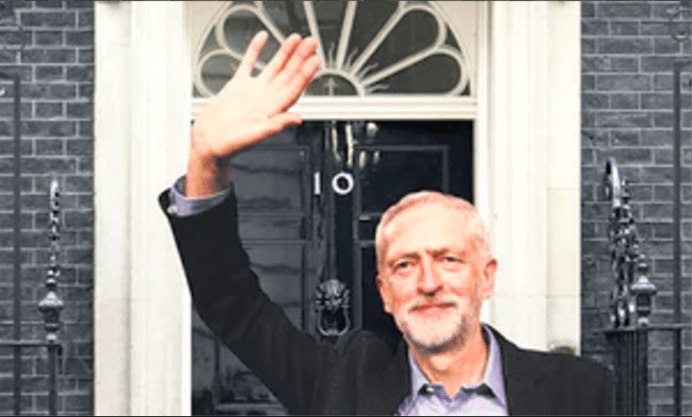Nick Timothy has penned an honest and reflective piece about the Tory election boorach. It can’t have been easy to write less than a week on from defeat and his departure from Downing Street. The most important point he makes is substantive. Theresa May abandoned the One Nation vision she sketched out on the doorstep of Number 10 upon becoming Prime Minister. It was a blueprint for a modern conservatism that believed in markets but didn’t worship them, that championed liberty but also the freedom to take advantage of its opportunities. It was a communitarian Toryism halfway between Burke and Berlin — the kind of politics advocated by Robert Halfon, sacked by the PM in an apparent effort to make sure she had alienated absolutely every last person who ever rated her.
But Nick also raises the issue of campaigning and provides some insight into the thinking that went on behind the scenes. Everyone was convinced the Tories were heading for a comfortable majority – Lynton Crosby reckoned 60, the curiously employable Jim Messina modelled it at 92. This is fair enough. Almost everyone planned for a Tory majority (I expected 90ish pre-‘dementia tax’, 50ish post) so it’s hard to fault the campaign for this. But it does suggest that either the strategists were misreading the numbers or the numbers were wrong. The rationale for the Tories’ strategy is striking:
‘We envisaged a return to traditional campaigning methods, with daily press conferences to scrutinise Labour and promote our policies. Theresa, never comfortable hogging the limelight, expected to make more use of her ministerial team. On the advice of the campaign consultants, and following opinion research that showed Theresa to be far more popular than the party or her colleagues, we eschewed our instincts. We were wrong to do so.’
There are two points in this paragraph that deserve a bookmark. First, clever tactics overruled intuition to disastrous effect. Putting the Prime Minister front and centre only made sense if she matched up to the public perception of her as a no-nonsense headmistress leading her school through a crisis. In the event, the school turned out to be St Trinian’s and Mrs May an unconvincing Alastair Sim. We will never know what a ministerial campaign, necessarily casting more scrutiny on the likes of John McDonnell, would have meant for the final result.
The second takeaway is that the Conservative campaign was remarkably Old Labour in its style. The Tories were antagonistic towards the media, dragging London-based correspondents to events hundreds of miles away only to refuse questions. Local reporters were either snubbed or given a two-minute slug of RoboMay, an automaton of bromides and blandishments. Did the campaign not think local media had websites and Twitter accounts from which to amplify these portraits of her personal failings?
Meanwhile, the pro-Corbyn forces — the official Labour campaign plus guerrilla digital activists — took the fight to social media, especially Facebook. While Tory strategists huddled round the 10 O’Clock News to find who had ‘won’ the day, they had no idea the day had already been won hours earlier when voters checked Facebook on their phone while bored at work in the afternoon or later on the iPad while they made the kids’ tea.
Where Old Labour’s philosophy of campaigning shines through in Nick’s piece is on the backlash against the ‘dementia tax’:
‘Somehow we have reached a point where older people with assets expect younger, poorer people to pay for their care. With Britain’s demographics, that is not sustainable; neither is it socially just.’
Of course he’s right. Across the West, entitlement reform is a pressing issue but election campaigns are not the place to be raising issues. Politics is a sales pitch, not a university seminar. You don’t try to reason with the voters when you’re asking for their vote, you try to reason with them after you’ve got it and are back in power. Well-intentioned though such candour is, it recalls pre-Blair Labour’s self-punching insistence on filling its manifestos with all the Labour policies that terrified the electorate. Indeed, it was those inveterate apologists for welfare state socialism, the Spectator, that coined the term ‘dementia tax’ and first recognised its political toxicity. The Scottish Tories gutted their manifesto of Nick’s granny-baiting reforms and prospered for it.
Here again is a contrast with Labour, for Jeremy Corbyn went around the country telling anyone who would listen that they could have all that was good and sweet in life but shied away from talking about the economic costs.
The Tories sought Margaret Thatcher’s 1983 majority but didn’t realise they were replicating Michael Foot’s 1983 campaign. Labour, by contrast, packaged their living repudiation of Blairism in a campaign that was slicker and more image-driven that anything Peter Mandelson could ever have devised. Corbyn didn’t gain Labour 30 seats by being true to his lifelong leftism but by compromising where he could stomach it and lying about it where he couldn’t. (It’s true, Corbyn like Foot addressed a great many rallies but can anyone remember a single word he said at them? Their value was in reinforcing the image of a Prime Minister hiding in Number 10 while the Labour leader listened to the punters.)
There is a sense in which this is all a bit pointless, shutting the strong and stable door after the horse has bolted. But there are lessons for the Tories if they are to be in with a chance of preventing the calamity which their hopeless campaign has made chillingly possible: Prime Minister Jeremy Corbyn.







Comments